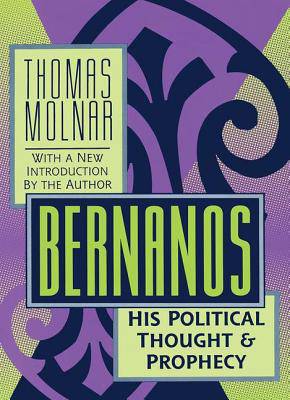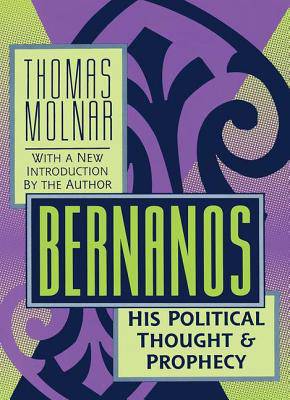
- Retrait gratuit dans votre magasin Club
- 7.000.000 titres dans notre catalogue
- Payer en toute sécurité
- Toujours un magasin près de chez vous
- Retrait gratuit dans votre magasin Club
- 7.000.0000 titres dans notre catalogue
- Payer en toute sécurité
- Toujours un magasin près de chez vous
105,45 €
+ 210 points
Format
Description
Thomas Molnar's Bernanos is an illuminating study of the personal evolution of the French Catholic novelist Georges Bernanos from a reactionary royalist to a religiously principled anti-fascist. It also provides a detailed account of the intellectual divisions within the French Catholic Right and suggests a number of parallels with intellectual and literary figures on the secular and religious left including Zola, Peguy, and Simone Weil. But, as Molnar points out, the significance of Bernanos is not exhausted by his writings. Bernanos the man is as deserving of attention as is Bernanos the novelist, essayist, and social critic.Molnar shows Bernanos against the troubled political-religious background of modern France: the Dreyfus case, the disillusionment following World War I, the Franco regime, Vichy, and the beginnings of the cold war. Whatever touched France touched Bernanos, and he flung himself into each crisis, not armed with a political system nor an academically sanctioned philosophy, but with a peasant's respect for what is and a Christian's sense of what might be. The portrait that Molnar draws is that of a passionately concerned Christian who knows that truth is hard to come by, but who is ready to follow it wherever it leads, regardless of the consequences.A crucial theme covered by Molnar is Bernanos' long and conflicted relations with Charles Maurras and the Action Francaise. He makes clear the extent to which Bernanos' fervent Catholicism set him apart from Maurras whose positivistic inspiration and passion for order helped lay the groundwork for the political collapse that led to the Vichy regime. Thomas Molnar's book is a fascinating account of Georges Bernanos' stature as both a political thinker and an important novelist. Bernanos will be enjoyed by historians, political scientists, philosophers, theologians, and scholars of literature.
Spécifications
Parties prenantes
- Auteur(s) :
- Editeur:
Contenu
- Nombre de pages :
- 240
- Langue:
- Anglais
Caractéristiques
- EAN:
- 9781560009320
- Date de parution :
- 01-12-96
- Format:
- Livre broché
- Format numérique:
- Trade paperback (VS)
- Dimensions :
- 152 mm x 226 mm
- Poids :
- 362 g

Les avis
Nous publions uniquement les avis qui respectent les conditions requises. Consultez nos conditions pour les avis.






